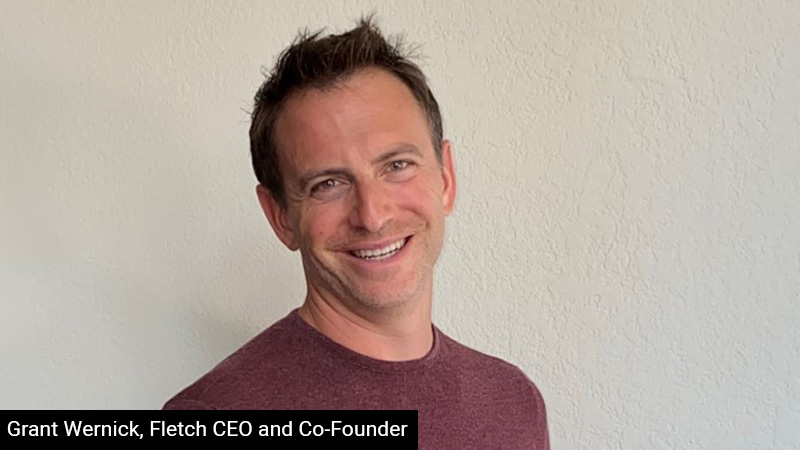Fletch Aims to Bring Cybersecurity Analytics to the Masses
Although cybersecurity is extremely important for today’s businesses, it can also be extremely complicated. Not many small firms have personnel who are trained to constantly analyze threats, dig through mountains of data, and determine if and how the company’s cyber defenses have been breached.

That’s where Fletch, a cybersecurity analytics startup, comes in. It provides “cybersecurity intelligence” that’s fast, affordable, and effective — even for clients with limited or no in-house cybersecurity expertise. This intelligence helps small and medium-sized companies protect their data and stay safe in an increasingly interconnected world.
“Data is everywhere, but finding, normalizing, and correlating it takes not only a highly skilled team of engineers, but an enormous amount of time and effort to derive any valuable insights,” says Fletch CEO and co-founder Grant Wernick. He says with the analytics tools currently on the market, “harvesting insights from data often takes months and hundreds of hours to initially set up and then continuously maintain – time and resources most organizations don't have.”
Fletch aims to offer a more “human-centric, inclusive, affordable, and automated” approach to analytics in which “machines take care of the mundane and monotonous work for you, so leaders can get the intelligence they need,” Wernick says. “The most technical can focus on the hard problems only they can solve, and we can expand the hiring pool to include critical thinkers of diverse backgrounds.”
History of Entrepreneurship
Fletch isn’t Wernick’s first rodeo when it comes to startups. “Early in my career, I was drawn to entrepreneurship and began consulting for companies like AngelList, helping with product ideation and initial growth,” he says. Then in 2010, he co-founded a natural-language search product called Weotta that was a Tech Crunch Disrupt Finalist in 2011. “We quickly learned that to monetize Weotta, we had to go into the business of selling consumer data, and that we could take what we had learned to tackle a much bigger problem for those building and growing companies.”
In 2015, Wernick co-founded Insight Engines, a company that “took security guards and turned them into security analysts overnight” by building a natural-language search interface on top of cloud-based data platform Splunk and automating the arduous task of data modeling. They sold Insight Engines’ product to Fortune 100 companies, healthcare companies, and government organizations, among other customers. “Through this journey, we learned so much about the problems those on the front lines of data analytics face every day, especially in security,” he says. “I became more passionate about solving the data problem for everyone, and not just those using Splunk. This is why we created Fletch.”
Cyber Analytics for Everyone
Fletch provides several interrelated cybersecurity and data analytics tools that can (among other things):
- Detect risky behavior across a company’s cloud-based and software-as-a-service applications, determine who is involved, and suggest what to do next;
- Evaluate a company’s cloud environment so executives can identify any gaps and implement best practices to mitigate potential breaches;
- Provide intelligence about emerging cybersecurity threats, explaining how they could impact a particular business and how to address problems before they arise.
Fletch accomplishes all of this using a natural-language search engine that “automatically delivers intelligence at scale to solve the most pressing problems every security team faces,” the company says. Its artificial intelligence-based search technology delivers “insights, visualizations, trends, and context, all in human language to cut through the clutter and guide security teams on how to best scale operations, make decisions quickly, and prevent havoc.”
“Fletch is leading the way organizations interact with data,” Wernick says. “We are applying our years of experience within cybersecurity, data, and natural language processing to surface instant intelligence so you can get the insights you need today, not months from now.”
He adds that his company’s product is especially important because small and medium-sized companies face IT talent shortages and increased cyberattacks – not to mention a global pandemic that made cybersecurity even more important as many people shifted to working from home.
Perseverance and Teamwork
Although Fletch is finally starting to fulfill its potential, the road has been long and arduous because the data analytics problems the company is trying to solve are extremely difficult. As a result, although Fletch is almost three years old, it is only now releasing its first product. “It has been hard, and most founders I know don’t have the patience for such a journey,” Wernick says. “This level of automation is a real breakthrough because it requires a longer-term approach, and it’s one that tests my drive daily.”
That said, difficult challenges come with the territory when you’re founding any startup. The key is to hang in there, keep your long-term goals in mind, and not go it alone. “My best advice for others looking to do hard things is to keep your vision clear and focus on your journey,” he says. “Don’t pay too much attention to the hype, and surround yourself with great people – your team, mentors, and early adopters. Think of [your company] as a living entity that needs a massive amount of energy to will it into existence.”
Humility and Continuous Learning
It’s important not to assume you have things all figured out because a little humility can make you a better founder and help your company succeed. “Always be willing to learn something new from everyone around you,” he says. “Find mentors of diverse backgrounds who have done it before, and learn everything you can from them.” Additionally, “hire people who are smarter than you,” making sure they are both multitalented and particularly skilled in at least one crucial area. “Raise money from people who aren’t just names, but also understand your vision, will make you better, and will be there for you even when things get challenging,” Wernick says. “Find early adopters who are willing to hammer on something that still embarasses you, and make sure to balance their feedback with your vision so you build something many will use.”
About the Author

An analyst of global affairs, Adriaan has an MSC from Oxford, with diverse interests in the digital economy, entertainment, and business. He is a specialist trainer in advanced analytics and media.
Startup Resources
- Learn more about Startups
- Visit the TRUiC Business Name Generator
- Check out the TRUiC Logo Maker
- Read our Business Formation Services Review
- Find Startup Ideas
- Explore Business Resources
Form Your Startup
Ready to formally establish your startup? Click below to read our review of the best business formation services!
Best Business Formation Services